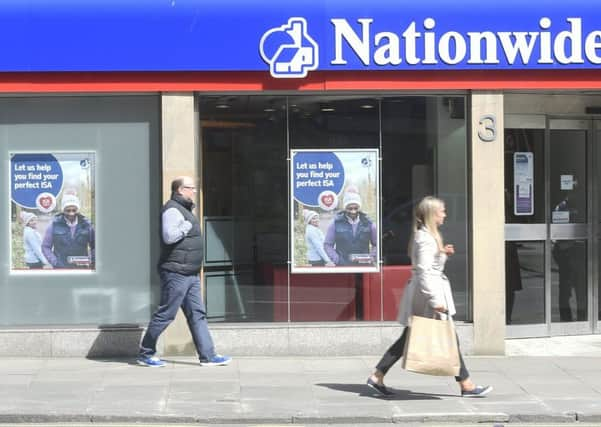Banks under fire over charging and services


A new cap on monthly overdraft charges is among the measures set out by the Competition and Markets Authority (CMA) in a long-awaited report on the current account market. The 18-month investigation followed an initial study that found there was a lack of effective competition in the market and needs of customers were not being met.
In the provisional decision published last week, the CMA said charges are “complicated and opaque” and that it was hard for customers to work out if they are getting good value. It set out several measures aimed at reforming the market – but which experts say fall a long way short of what’s needed.
Advertisement
Hide AdAdvertisement
Hide AdThe overdraft cap is the most eye-catching of its proposals, while it also wants customers to be automatically signed up for text alerts warning them if they’re about to slip into the red.
However, the level of the cap would be set by each bank rather than by a regulator, while some banks already offer alerts for those going close to exceeding their overdraft limit.
Banks raked in some £1.2 billion in 2014 from unauthorised overdraft charges, according to the CMA, but experts say the CMA has done too little to address the issue.
The challenge of comparing current accounts on a like-for-like basis has become even harder in recent years as banks have introduced different account structures. The most popular account on the market, for instance, is the Santander 123 account that offers in-credit interest and cashback on direct debit bill payments, in exchange for a monthly fee that was recently hiked from £2 to £5.
Several banks, including Bank of Scotland, Royal Bank of Scotland, and Barclays, now levy daily and monthly fees for agreed overdrafts, as well as interest charges.
The banks that replaced interest rates with daily or monthly fees claim they are easier to understand, yet for many customers they are significantly more expensive. The difficulty lies in knowing whether you would be better off with a fee-based overdraft or one with interest rate charges.
“The myriad of different overdraft tariffs and charges make it seriously difficult for consumers who get overdrawn to compare which is the best deal for them, and this is especially the case for unauthorised overdrafts,” said David Black, director of DJB Research.
The CMA also decided against forcing a shift away from “free if in credit” accounts, despite growing calls for the so-called free banking model to be scrapped. The principal charge against free banking is that those who pay overdraft charges are effectively subsidising those that remain in credit.
Advertisement
Hide AdAdvertisement
Hide AdCross-subsidisation also obscures the price that people actually pay for their current account, making it impossible to work out the true value.
The report claimed that with many current accounts no longer paying interest to customers in credit there’s no longer any such thing as free banking. Yet several current accounts offer interest of 3 to 5 per cent, while others pay monthly rewards to those depositing a certain amount.
The current system also supports the high street banks that provide around 70 per cent of current accounts.
“Certainly the banks make a lot from overdraft fees and charges, from lending out credit balances in accounts and from packaged current account charges as well as from charges from peripheral non-standard transactions,” said Black.
Only radical action such as ending the “free if in credit” model will end the big four’s domination of the current account market, according to Andrew Hagger, personal finance expert at Moneycomms.co.uk.
“The big banks will be happy with what’s been proposed by the CMA to date. While it will involve some additional work around alerting customers with unauthorised overdrafts, it’s in no way a game changer,” he said.
“With the final report due in late summer those banks will have their fingers crossed that the CMA doesn’t spring a last-minute surprise that would loosen their stranglehold on the personal and small business bank account sectors.”
The CMA has also come under fire for ignoring calls to introduce account number portability. More than half of consumers surveyed by comparethemarket.com said they would be more likely to switch if they could take their account number with them.
Advertisement
Hide AdAdvertisement
Hide AdJody Baker, head of money, comparethemarket.com, said: “If the CMA or government took steps to address the account number portability issue, we estimate that around £5bn would be returned to the pockets of the British public over a ten-year period due to the increased competition and resulting reduction in interest rate charges and bank fees as well as the increase in interest rates paid on balances.”
Some proposals were more widely welcomed, however. They include the requirement on banks to develop and adopt open Application Programming Interfaces within a specified timetable. “This would increase competition by enabling the consumer’s account transactions to be securely shared thus enabling tailored current account comparisons,” said Black. “It’s worth noting that the government’s Midata initiative already enables this to an extent.”
The initiative allows customers to download 12 months of account transactions in a spreadsheet. That can then be uploaded into comparison site tools to assess how it measures up against other options.
But even then the odds remain stacked against consumers, who are in a “weak negotiating position,” said Sue Lewis, chair of the Financial Services Consumer Panel. “Those consumers who do want to switch will continue to be hampered by the obscure costs and charges inherent in ‘free if in credit’,” she said. “Comparison websites are not a panacea, and indeed are more likely to lead to ‘information overload’ and inertia.”